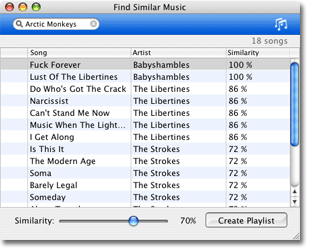An interesting article in Physorg
summarizes research that indicates that the perception of rhythm is
tied to one's culture. People from different cultures perceive different rhythms in identical sequences of sound. Read the article: Speakers of different languages perceive rhythm differently - Thanks, Jeremy
Monday Dec 04, 2006
Sunday Dec 03, 2006
It is getting close that wonderful time of year at Sun, we have
the week between Christmas and New year's off - so its a week of family
time - at the Lamere household we spend a good deal of that time playing
games - board games and card games - no electricity required. We
have lots of favorites: Carcassonne, Settlers of Catan, Attack of the
Killer Rabits, Citadels, Apples to Apples, Ticket to Ride, Elfin
Land.
I'm starting to cast about for this year's holiday week
game - it has to allow for 3 to 5 players - be suitable for ages 12 and
up and fun - so I'm open to any suggestions.
A few months ago, I had one of those 'oh crap!' moments - I was working on Snapp Radio, my mashup of music and photos - when someone sent me an email with that contained just a URL: http://www.sleevenotez.com/.
I took a quick look at their site and saw to my increasing dread
that they were making a mashup that seemed to be very similar to Snapp
Radio - while you listen to music they would show related information
about what you were listening to. Looking a little closer - I
realized that what sleevenotez was doing is very different than Snapp
Radio - Snapp Radio is a lean-back interface - it is meant to be
something that you enjoy in the background - sort of a relaxing backdrop
to your music - something you could use while you are taking a bath whereas sleevenotez is a lean-forward type of interface - something you use when you want to be actively engaged with your music.
Sleevenotez is a music companion website. Their byline is 'reatime info for your digital music'. While you listen to music Sleevenotez will scurry off to various corners of the web to collect information about the artist and song you are listening too, and display it - providing a single page that gives you just about everything you'd want to know about an artist. Sleevenotez currently shows you:
- Artist biography - from the wikipedia
- Discography - from MusicBrainz
- CDs for Sale - from Amazon
- Photos of the artists - from Flickr
- Videos of the artists - from YouTube
- Lyrics for the song - from Lyrc.com.ar
Sleevenotez determines what your are currently listening to using the last.fm audioscrobbler 'now playing' feed. Thus there are a total 7 services combined by sleevenotez to build the artist/song page. You can also use sleevenotez to quickly aggregate information about an artist even if you are not listening to a song - they have an easy to understand URL syntax - so its easy to just plug in a URL like http://www.sleevenotez.com/artist/weezer to bring up all of the information about Weezer.
The
Sleevenotez team have an excellent design sense - they have all of the
Web 2.0 design goodness - pleasing color selections, curved borders,
killer logo, fading transitions - it is really quite a slick
interface - very polished for an alpha release - a very pleasing
experience all the way around. The information that they present is well
organized, tt's not overdone, there's no ajax for ajax sake
- the sleevenotez teams shows they have great design chops.

Sleevenotez is an alpha and as such there are a few problems. The biggest problem right now is that the 'realtime info' is delayed by several minutes - if you are listening to a song, the info for the song doesn't appear until the song is nearly over. This is an unfortunate side effect of using the last.fm web audioscrobbler web service - tracks are only scrobbled by the scrobbler when they have played for at least a certain amount of time (usually at least 50%). The result is that sleevenotez is always behind by a couple of minutes. The sleevenotez team is well aware of this issue - and have a plan to fix this (but this relies on some changes in how last.fm does things) that may take a while before this gets sorted out.
Sleevenotez
does on occasion have some trouble finding the right data - sometimes
it will show wrong information in the bio section - data about the
Buddist notion of trancendental happiness instead of a biography of a Seattle rock band, or punt on the lyrics, or show non-related photos - it is hard to get this right - try finding photos on Flickr for the band 'blur' - but since this is an alpha, we can cut sleevenotez some slack, I'm sure they'll improve this over time.
Ultimately sleevenotez may have a bigger problem with their business model - many of the webservices that they rely on - last.fm and flickr for instance - have terms-of-service that allow for non-commercial use of the services. Sooner or later sleevenotez may start making money with their site - via Amazon referrers or advertising (they may already be doing that now) - when that happens they'll have to make commercial arrangements with their data providers to avoid violating the terms-of-service - and that may be quite difficult. For now, most companies are content to look the other way and let people mashup their data - its all part of growing an ecosystem around one's data - it certainly can help companies like last.fm for instance if alternative interfaces spring up that ultimately drive people to use the last.fm plugin - but last.fm may also get a bit chuffed if a site like sleevenotez starts to siphon away Amazon referrers - it would only take a 'cease-and-desist' letter from a last.fm lawyer (or do they call them solicitors over there?) to make the house of cards come tumbling down.
The sleevenotez team has been blogging about sleevenotez development - they are agile developers and have even gone so far as to put some of their agile process data in their blog - here's iteration #1. I like that open development model.
I'm
really excited to see sleevenotez - it's a great mashup - and a very
useful music companion. I'm guessing the sleevenotez team will
continue to add more data to set of info shown for an artist and song -
album reviews, related artists, social tags, playlists, upcoming
concerts - anything you'd want to know about an artist. Once they
get the alpha kinks out of the system - the scrobbler-delay - and the
misguided data - sleevenotez will be one of the best ways to learn
more about the artists that perform our favorite music. It will
be interesting too, to see how they navigate through the uncharted legal
territory of trying to build a business on top of mashup
webservices.
Saturday Dec 02, 2006
Lucas Gonze writes that XSPF version 1 is complete and finalized - he says: the spec is completely 100% frozen. If there are still problems, they're not fixable. The thing will never ever ever change for any reason whatsoever. So it looks like it won't change. And while you are reading Lucas's blog, check out the post about Kevin Smith's iTunes playlist.
Friday Dec 01, 2006
I've been using the Findory lately as
personal newspaper of sorts - the findory keeps track of which stories
and blog posts I read and based upon these stories gives me new related
content every time I visit. I don't have to explicitly rate
stories, the Findory just figures things out based upon what I've
read. One neat thing about the Findory is that next to most
stories there's a little icon:
that tells me that the story was selected just for me - if I click on
the icon, the Findory will tell me why that story was selected.
The Findory also mixes in other stories that are not recommended
specifically for me, I assume because they are of general interest.
This
week, there have been an overabundance of stories about Britney
Spears and her lack of underwear on the Findory page. Looking at
the Findory right now I see 8 non-personalized general interest stories -
4 of them - are about Britney Spears' privates. Perhaps the
Findory is just reflecting what is going on in the blogosphere at large -
but I really wish there was a way I could tell the Findory that I am
not now, nor will I ever be interested in this kind of celebrity
news. Perhaps, the Findory will eventually figure out that I never
click on these stories and will eliminate them, but I wish I could just
make them go away now. So Greg, what can I do?
Thursday Nov 30, 2006
If you are looking to fill that beats-per-minute field for your music collection in iTunes, check out Tangerine - an iTunes companion app that will analyze your music collection for tempo and beat intensity and will write the BPM data to your iTunes database. This will enable you to create interesting playlists based upon tempo - for instance - that running playlist where all the songs are 130 BPMs. Tangerine is still in beta - it has a few rough edges - and the BPM isn't always accurate - but hey! its a beta - the UI is quite polished and the analysis is fairly fast (3 seconds per song). One note - if you have a lot of purchased music, you are out of luck - Tangerine can't analyze music that is DRM protected.
Wednesday Nov 29, 2006
Carolyn and the PR team put together this nifty feature called The Big Mashup
with interviews and commentaries from some of the movers and shakers in
the participation age - including Martin Stiksel, CCO of last.fm,
Andrew Baron, founder of Rocketboom and DJ Spooky. Plus there's a tie in with Snapp Radio.
It was one of those last minute scrambles to get Snapp Radio ready for this PR event. I did some testing on IE7 for the first time last night and found there was a rather ugly rendering problem. After lots of very bad words being directed at Redmond, I found the problem - yep, it was my bug after all, IE7 was just showing it better than Firefox or Safari.
Last night we also realized that some of the internal proxies/firewalls were not configured properly, so folks inside Sun cannot always get to Snapp Radio - thanks to the IT folks for figuring out where the problem was - things are being reconfigured now - so if you are inside Sun and can't get to Snapp Radio, try again in a few hours.
Now we are watching
the Snapp Radio server to see how well it stands up to the Big Mashup
load - its an old server - but so far it seems to be managing the
load. Since I'm not really a web app developer I'm interested in
seeing how well (or not) this app scales to many users.
This Wired article: Fine Tune Your Music Discoveries is a quick review of 4 popular music discovery sites: Pandora, Last.Fm. iLike and QLoud. The author gets it a bit wrong when he says that all of these sites use collaborative filtering to recommend music - Pandora relies on content-based matching of content, not collaborative filtering. Interestingly enough, the author liked the Pandora recommendations best. The author does point out the problem that collaborative systems have with popularity bias: Oddly, I found the more mainstream an artist is, the less precise your results are likely to be. The recommended artists similar to Neutral Milk Hotel, which is arguably the most left-field pick of the three, were almost universally more accurate across all four services. I do agree with the article that the QLoud's Ajax-heavy site is a bit of a turn off.
Photographer Michael Hughes has been visiting the great site-seeing spots of the world and has been taking photos that incorporate his souvenirs of the location into the photo. It's a really cool photo series. Check it out on Flickr: The Michael Hughes Souvenir Photo Series


Tuesday Nov 28, 2006
SimilarTunes is a super simple companion app to iTunes - you type the name of an artist in your collection and SimilarTunes will give you a playlist of similar songs that you can then add to iTunes. Unlike MusicIP or SoundFlavor, SimilarTunes doesn't perform any analysis of your music collection, instead it uses the web services of last.fm and MusicMobs to find similar artists that happen to be in your collection and displays songs by those artists. The app is clean and simple to use - just type in the name of the artist - and you have a new playlist.
SimilarTunes was developed by Joris Kluivers, a Dutch computer science student living in Amsterdam. Via Toby's Bookmarks
Monday Nov 27, 2006
RateYourMusic.com is an online community of music fans that review and rate music. RYM has thousands of users with millions of ratings and reviews. It is rather amazing how much depth there is in the RYM review catalog. Abbey Road has been rated 3,680 times and has 433 reviews. The latest Pearl Jam album has 587 ratings and 69 written reviews. Naturally, some of the reviews are your typical one word fanboy reviews: 'awesome' - but many of the reviews are well written, detailed explorations of the album - such as these reviews for In the Aeroplay Over the Sea by Neutral Milk Hotel.
With
all of these reviews and ratings, RYM can give us all sorts of nifty
charts - such as top albums (Bob Dylan's Highway 61 Revisited is the
alltime top album according to RYM). worst albums (William Hung is #2 on
this list) and Most owned albums,
Once you've rated a number of albums, RYM will give you recommendations based upon those ratings, as well as connect you to other users who have similar musical tastes.
RYM is a super source of reviews
for albums - this is an excellent resource for music information
retrieval researchers that are interested in data mining the words that
surround the music. The only thing RYM lacks is a good web api to
make it easy to extract the reviews for a specific album.
Sunday Nov 26, 2006
Foosic is a barebones Audioscrobbler
clone - it is an aggregator for song plays. Foosic provides a
plugin for a (small) number of players that will send your play history
back to foosic where they collect this data in a database. Using
this data, foosic offers charts on popular songs, artists, songs and
genres and active users. They don't offer any sort of
recommendations, they don't try to match you up with similar users, they
don't offer to sell you concert tickets for your favorite bands - all
foosic does is collect the playing history for lots of people and show
some very basic charts.
In some ways, I like the singularity of purpose of foosic - going to one of the leading Music 2.0 sites such as last.fm, iLike or qloud - is like going to Yahoo - there are twenty things on the home page, all shouting for your attention - going to foosic is like going to Google - the page is clean - nothing is shouting at you - the things you can do on the site are few and obvious.
Still, for a song play aggregator such as foosic, there has to be a compelling reason for people to want to go to the trouble of downloading and installing a plugin - I can't see any value a foosic contributor gets from foosic beyond seeing summary stats for their listening habits (which iTunes can duplicate pretty well), or knowing that they are contributing to a larger stats pool. Perhaps foosic will add features in the future that will give me a reason for wanting to install the plugin.
Like most companies in this space, foosic faces the problem of bad metadata. Songs are mislabeled or missing, artists are misspelled - genres are inconsistent. To deal with this problem foosic has chosen to develop their own audio fingerprinting system - so they can unambiguously identify a track and assign it clean metadata. I find it puzzling that they've decided to create their own system when the MusicDNS / MusicBrainz system solves their problem so handily. Foosic would have a much better chance of cleaning up their data with the MusicDNS system - they could resolve each track to a MusicBrainz ID and retrieve good clean metadata via the MusicBrainz api. Right now, foosic has 6 different spellings for 'Emerson, Lake and Palmer' and a dozen or so spellings of 'The Beatles'.
Despite
its somewhat low profile, foosic has collected quite a bit of data in
its first 9 months of operation. It has nearly 4,000 users, nearly 6
million submissions and data on 1.5 million tracks. According to
its submission statistics page, foosic is averaging about 9 submissions a
minute. This is pretty valuable data and foosic will likely be
able to some interesting things with it. Foosic may have some
scaling issues though - it takes 20 seconds to bring up the Top Songs
page. 20 seconds is an eternity on the web.
Foosic isn't the first song play aggregator - Audioscrobbler/last.fm has a 5 year head start, Google Music trends
has a brand name that will attract users - so I have to wonder what
foosic is going to do to distinguish itself from these other services.
It is still early days for foosic - I'm interested in seeing
where it goes.
This blog copyright 2010 by plamere






